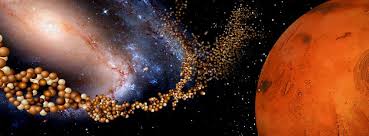
The fellowship application is now open for graduate courses this summer through the University of Nebraska-Lincoln’s Nebraska Math and Science Summer Institutes. While the 20% tuition discount is applied automatically for current classroom teachers taking in-person and web conferencing courses, you can apply for an additional fellowship from the University of Nebraska Foundation funds. Apply here: https://forms.gle/TLnuLuo5t1isXExE9. Please note that funds are limited this year.
Visit our course catalog to see all of our options: https://scimath.unl.edu/nmssi-course-catalog-2023. As follows are a few courses we would like to bring your attention to:
ASTR 892 - Life in the Universe for STEM Teachers
For secondary science teachers (other audiences: math teachers with secondary certification or grades 7-8 science teachers)
Class #: 3042, Online (Asynchronous), May 30-June 30 (5 weeks)
This course on astrobiology focuses on the question "Are we alone in the Universe?" and applies scientific reasoning to the possibility of life somewhere other than Earth. It will study how life arose, how it has evolved over time and the conditions necessary for life to exist. It includes topics and pedagogical strategies in astronomy, biology, geology, paleontology and chemistry, and utilizes an integrative interdisciplinary approach needed to study today's complex problems. This course may also be appropriate for seventh- and eighth-grade teachers. This course is appropriate for mathematics teachers with secondary certification.
**NEW** BIOS 891 - Physiology in Extreme Environments
For middle-level and secondary science teachers
Class #: 3039, Web conferencing, July 10-14 and 17-21, 2-4 p.m. (Zoom)
This two-week course will explore organismal physiology in extreme environments. Students will engage with real-world examples of extreme physiology and adaptations in harsh environments such as how giant mammals can survive in deserts, how mosses and ferns can thrive in the tundra, and how some fish endure sulfidic water! Additionally, over-arching themes across multiple physiological systems will be integrated cross-cutting concepts in physics and chemistry.
The Benefits of the NMSSI:
• Each course is 3 graduate credit hours
• Courses will be offered utilizing several instructional models to allow for flexibility in scheduling
• Enroll in one simple application as a post-bac student at https://go.unl.edu/gradapp
• In-person and web conferencing courses give teachers a 20% discount on in-state tuition
Take advantage of these professional development opportunities conveniently and affordably. Join the NMSSI community and “learn in place!” Contact us at nebraskamath@unl.edu with questions.